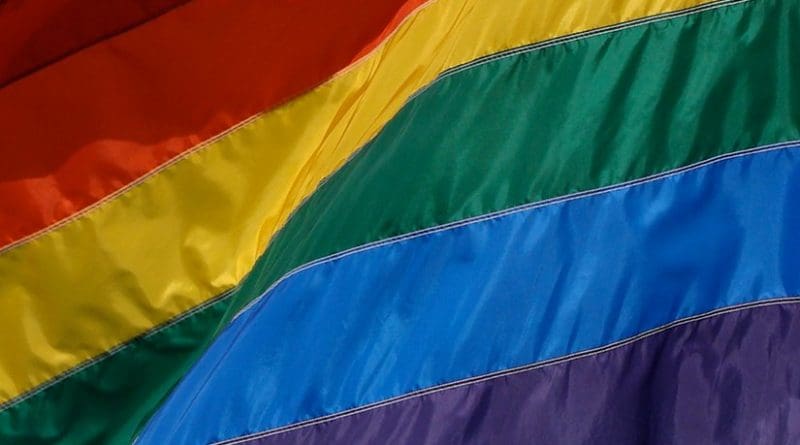Indonesia: Pro-LGBT Facebook Post Draws Anti-Gay Reaction
By BenarNews
By Ahmad Syamsudin
LGBT people in Indonesia are facing renewed pressure after a ride-sharing company’s message of support triggered an anti-gay response in the world’s largest Muslim-majority country.
In a message on Facebook that has since been deleted, Brata Santoso, a vice president at the ride-sharing company Go-Jek, wrote about a campaign called GOingALLin to celebrate Coming Out Day on Oct. 11.
“I’m happy to say that Go-Jek is taking diversity to the next level by the adoption of non-discrimination policy toward the underrepresented group, ie LGBT,” Brata wrote, referring to the lesbian, gay, bisexual and transgender community.
“In the spirit of Coming Out Day, we wanted to give space for the brave ones who embrace diversity and share what freedom, self-acceptance, authenticity, equality and tolerance really means to them,” Brata wrote.
A screenshot of the message went viral on social media and led to calls to boycott the app using the hashtag #uninstallgojek on Twitter.
Since then, the company released a statement that the post was Brata’s personal opinion.
“Go-Jek strives to hold up high the culture and values of Indonesia,” it said.
On Thursday, a Go-Jek spokesman said the company required that Brata take part in social activities “to make him more sensitive,” Tempo.co news website reported.
A day earlier, Religious Affairs Minister Lukman Hakim Saifuddin urged Indonesians to treat the LGBT community with empathy and respect, but he called their behavior deviant.
Conservative Muslims have accused Lukman of supporting the LGBT community because of his moderate views and because he attended an event in 2016 organized by the Indonesian Alliance of Independent Journalists where LGBT members were honored.
“It is our obligation as religious people and religious leaders to provide guidance to them with empathy so that they cease doing what they do,” he said in a video message posted on the ministry’s official Twitter account.
Homosexuality is not a crime in Indonesia except in Aceh where Sharia law is in force.
That could change.
Under a draft revision to the criminal code being debated in the House of Representatives, a person engaging in “a lewd act” with another person of the same sex who is younger than 18 could face 12 years in prison. If the act involves violence, the penalty is up to 15 years.
The draft stipulates that a lewd act committed in public between two people of the same sex is punishable by up to 18 months in prison. It also says sex between a man and a woman who are not married to each other is punishable by up to five years.
Pressure on LGBT community
Police have raided places frequented by gay people and briefly detained hundreds suspected of being homosexuals. Officer filed charges against some of them for committing prostitution or pornographic acts.
The government of Cianjur regency, in West Java province, issued a circular urging Muslim preachers to talk about the dangers of homosexuality during their Friday sermons.
“It’s one of the efforts to prevent the spread of LGBT in our area,” said Gagan Rusganda, a spokesman for the regency office.
Arus Pelangi, an LGBT advocacy group, said anti-gay sermons would endanger members of the community.
“Such calls will only increase the persecution of LGBT people. Even without it, LGBT people are already threatened,” Arus Pelangi chairwoman Yuli Rustinawati said.
The mayor of Balikpapan, in East Kalimantan province, said he would issue an anti-gay regulation in response to the emergence of a Facebook group “Pin Gay Balikpapan.” He said such a decree did not require the approval of the city council.
Meanwhile, Cholil Nafis a leader of the Indonesian Council of Ulema, said he supported the crackdown.
“We are facing an LGBT emergency, because people with the disease now feel normal,” Cholil said.
“Sermons calling for avoiding LGBT are necessary. We have to counter this,” he said.
Slamet, an activist for Gaya Nusantara advocating for LGBT rights, said the reactions by officials were political posturing during the election season.
“This is just a repeat of old stuff, because I think they know that LGBT isn’t a disease or deviance,” he said. “The political undertone is very strong, because people are passionate about the LGBT issue.”
Most of the country sees the LGBT community as a threat, according to a survey last year by a Jakarta-based firm, Saiful Mujani Research and Consulting. The survey showed 85.4 percent of the nation felt threatened by LGBT people – a figure that increased to 87.6 percent three months later.
Additionally, 79.1 percent of respondents objected to having LGBT neighbors. Despite those concerns, 57.7 percent of Indonesians believed that LGBT members had rights and about 50 percent believed the government was obligated to protect them, according to the survey.

